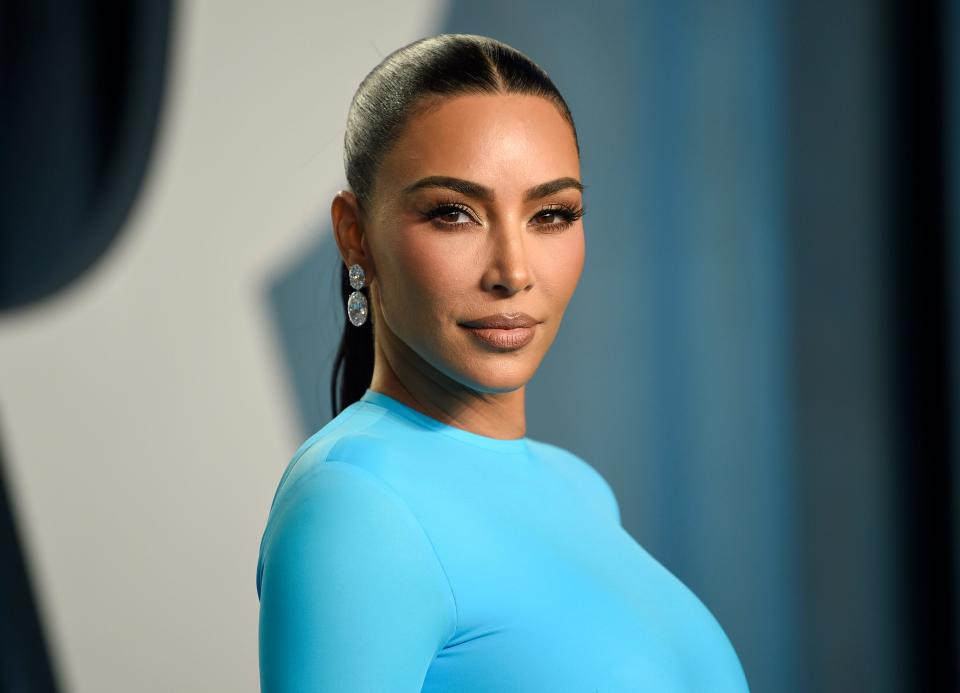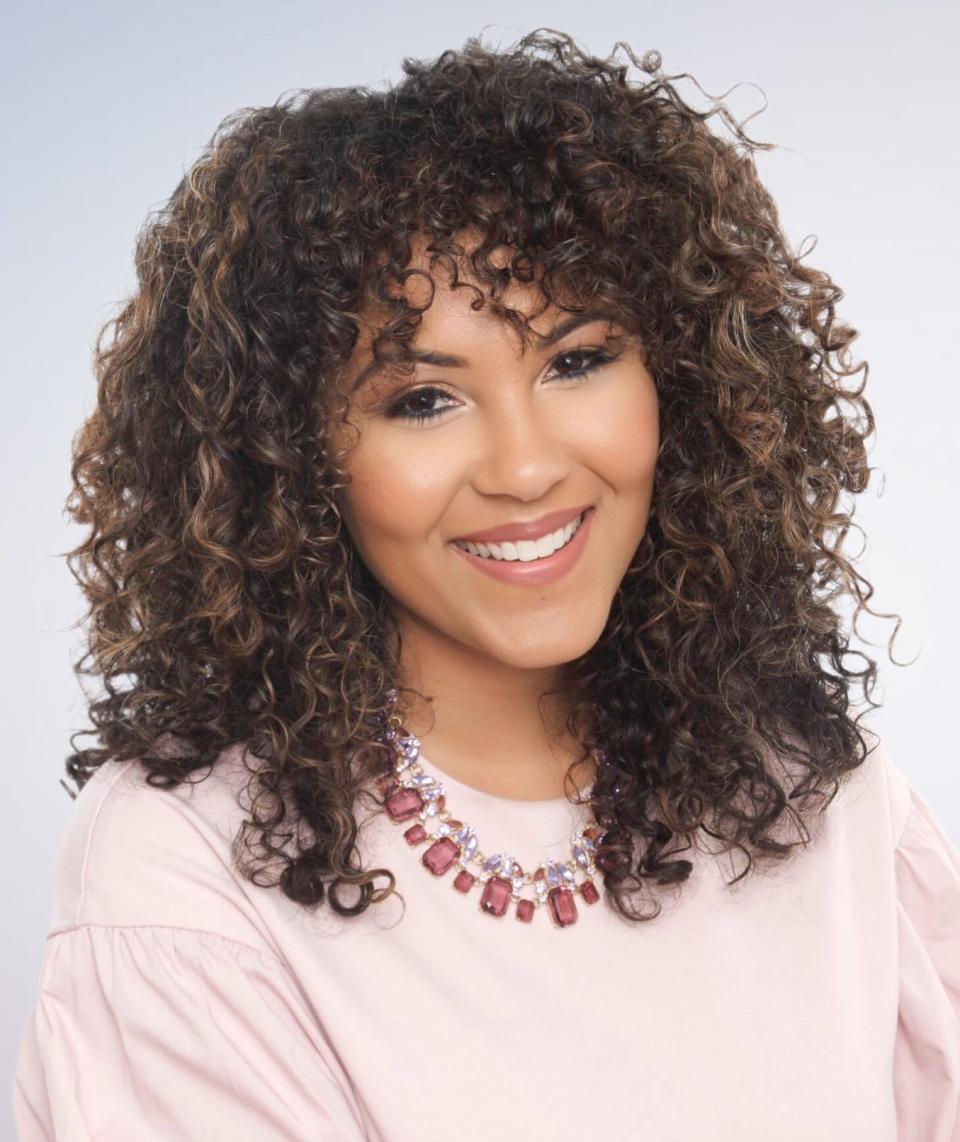Social media filters are fun, and also noninclusive, unhealthy and unrealistic
- Oops!Something went wrong.Please try again later.
In this generation of instant gratification and technology dependence, beauty culture has become more extreme and unforgiving, causing even its most prominent purveyors to have difficulty keeping up.
Kim Kardashian, while promoting her new luxury skincare line, SKKN By Kim, recently joked to The New York Times that she might consider eating poop every day if it would make her look younger.
For many people, including Kardashian and her more than 320 million Instagram followers, beauty standards have become impossible to live up to without artificial reinforcements of varying levels of permanence, investment and absurdity. They include hair extensions, shapewear, “detox” tea, diet pills, skin lightening and darkening treatments, cosmetic injections and even risky surgery.
Celebrities and cultural influencers like Kardashian also perpetuate this harmful ideology with the commodification of appropriated and artificial aesthetics, potentially causing a detrimental impact on mental health, self-esteem and the way many define what is “beautiful” and worthy of praise.

Even something as seemingly trivial as the facial filters now commonplace on social media perpetuate unhealthy, unrealistic beauty standards while being grossly exploitative and racist.
More: Guess what? It's too late to start worrying over Kim Kardashian's daughter's social media.
More exploitation, more engagement
Recently, certain Instagram filters and effects were temporarily disabled in Texas due to a lawsuit filed by Texas Attorney General Ken Paxton. The suit alleges that Meta misuses facial recognition technology by storing and using biometric data without proper consent.
Users now have to opt in to access all of the available filters. Perhaps the lawsuit is yet another misguided waste of state resources, but the ability to consciously choose the way your likeness is altered could support a more authentic, diverse and inclusive user experience on social media while pushing back against a toxic, manipulative culture.
Among other effects, the previously banned “augmented reality” filters alter the face – adding eyelashes and makeup, smoothing and lightening skin, adding freckles, changing eye shape and color, slimming and otherwise modifying facial features – sometimes making users unrecognizable.
These changes, presented and perceived as more desirable and aesthetically pleasing, are rooted in Eurocentric standards of beauty, erasing the features more commonly associated with people who aren't white.
They can be fun to use, but when based on the narrow scope of European features and beauty ideals, using filters quickly goes from subtly enhancing to comically caricaturesque for people of color.
Tech and culture blogger Jennimai Nguyen shared her experience about TikTok: "It looked ridiculous, to say the least. The enlarged, bright blue eyes, flushed cheeks and noticeably thinner nose looked extremely out of place on my Vietnamese face."
The use of these filters is rewarded with more exposure, thus making them more likely to receive engagement.
Our faces don't need 'fixing'
More than 600 million people have used at least one augmented reality (AR) effect on either Instagram or Facebook, with beauty filters being one of the most used categories, according to MIT Technology Review.
The popularity and prevalence of these filters underscore the societal belief that imperfection, aging and individuality are unacceptable and that if you don't align with a very narrow and specific form of beauty, then something is wrong with you and in need of "fixing."
These warped ideals and definitions pass to technology, which then amplifies and returns them for our consumption. AR filters are developed through "deep learning," in which a computer is trained to recognize facial features from photos of real faces.
In order to do that, the machine has to first be programmed to understand the individual attributes of the person in the picture before it can create a standardized filter. This is harmful and dangerous because as much as people want to believe that technology is neutral, it is, more often than not, shaped and powered by racist thought patterns and skewed data sets from creators, whether intentional or not.
A 2018 Gender Shades report shows the alarming rates at which machine learning algorithms can discriminate based on gender and race, with darker-skinned women receiving the lowest algorithmic fairness.
The National Institute of Standards and Technology also found that face recognition technologies across 189 algorithms are the least accurate for women of color.
It is not feasible to expect quality output from poor input.
More: Why force braiders into useless beauty schools? Expensive mandates pile onto student debt crisis.
Beauty should be unfiltered
In the classic 1996 book "Technologies of Seeing: Photography, Cinematography and Television," author Brian Winston writes, "Color photography is not bound to be ‘faithful' to the natural world. Choices are made in the development and production of photographic materials."

Fast-forwarding to 2022, if AR filters learn from inaccurate, noninclusive, discriminatory technology and source material, the results are guaranteed to reflect as such.
Filters are fun, to be sure. I use them, too. This isn’t an indictment of filters or people who enjoy them. It’s a call to freedom from the unhealthy, unrealistic culture that demands we forsake the ability to define for ourselves what and whom we value.
We’ve become so accustomed to the altered version of ourselves and others that the definition of what is beautiful has become constricted, curated and commodified at the expense of diversity, authenticity and individuality.
In truth, beauty is expansive, autonomous, inclusive – and up for broad interpretation. It has texture, character and a life of its own that deserves to be celebrated, not sifted into submission.
Lola Vinson is a communications strategist specializing in race, culture and public policy.
You can read diverse opinions from our Board of Contributors and other writers on the Opinion front page, on Twitter @usatodayopinion and in our daily Opinion newsletter. To respond to a column, submit a comment to letters@usatoday.com.
This article originally appeared on USA TODAY: Influencers like Kim Kardashian use filters to define beauty standards

